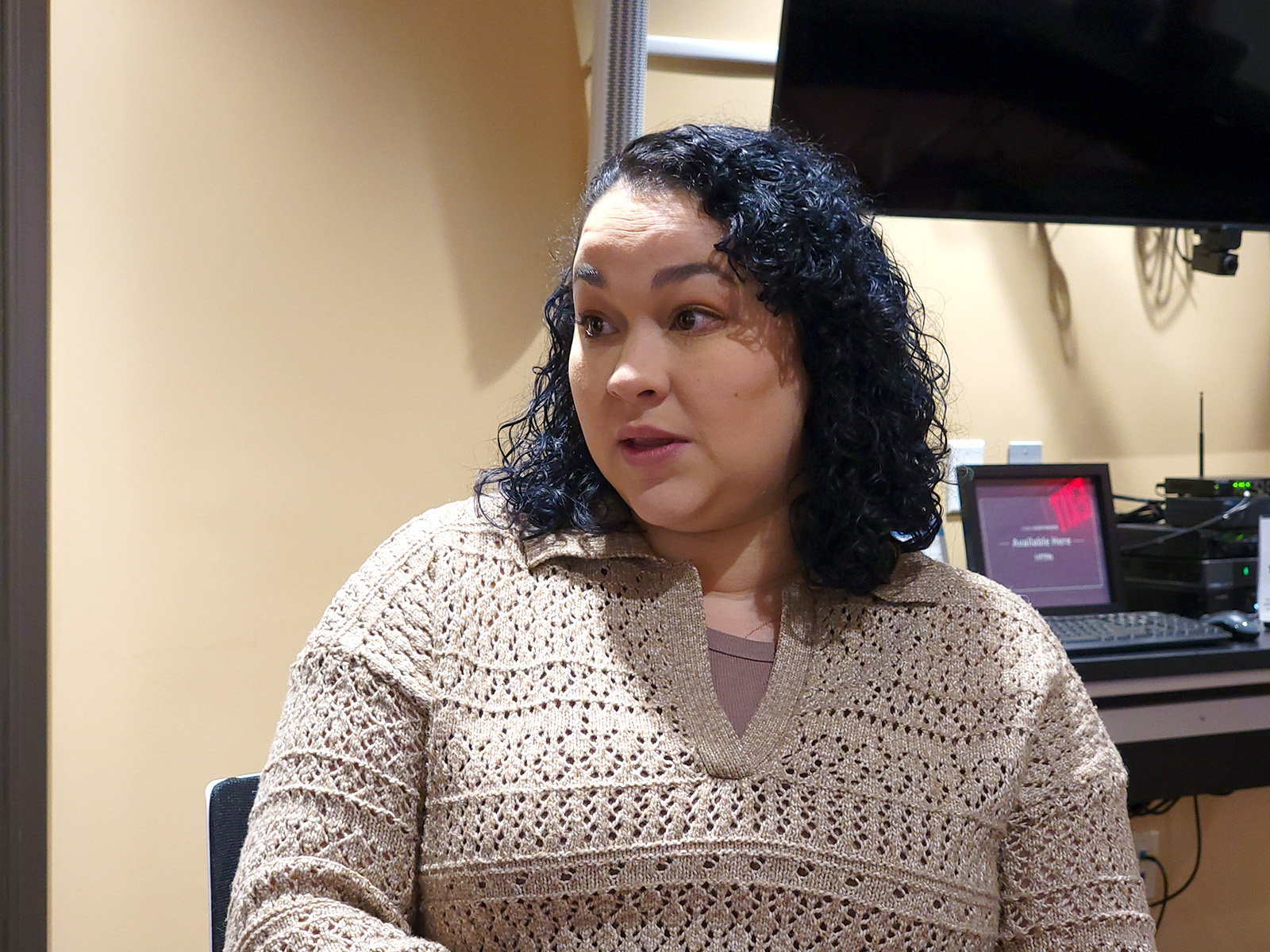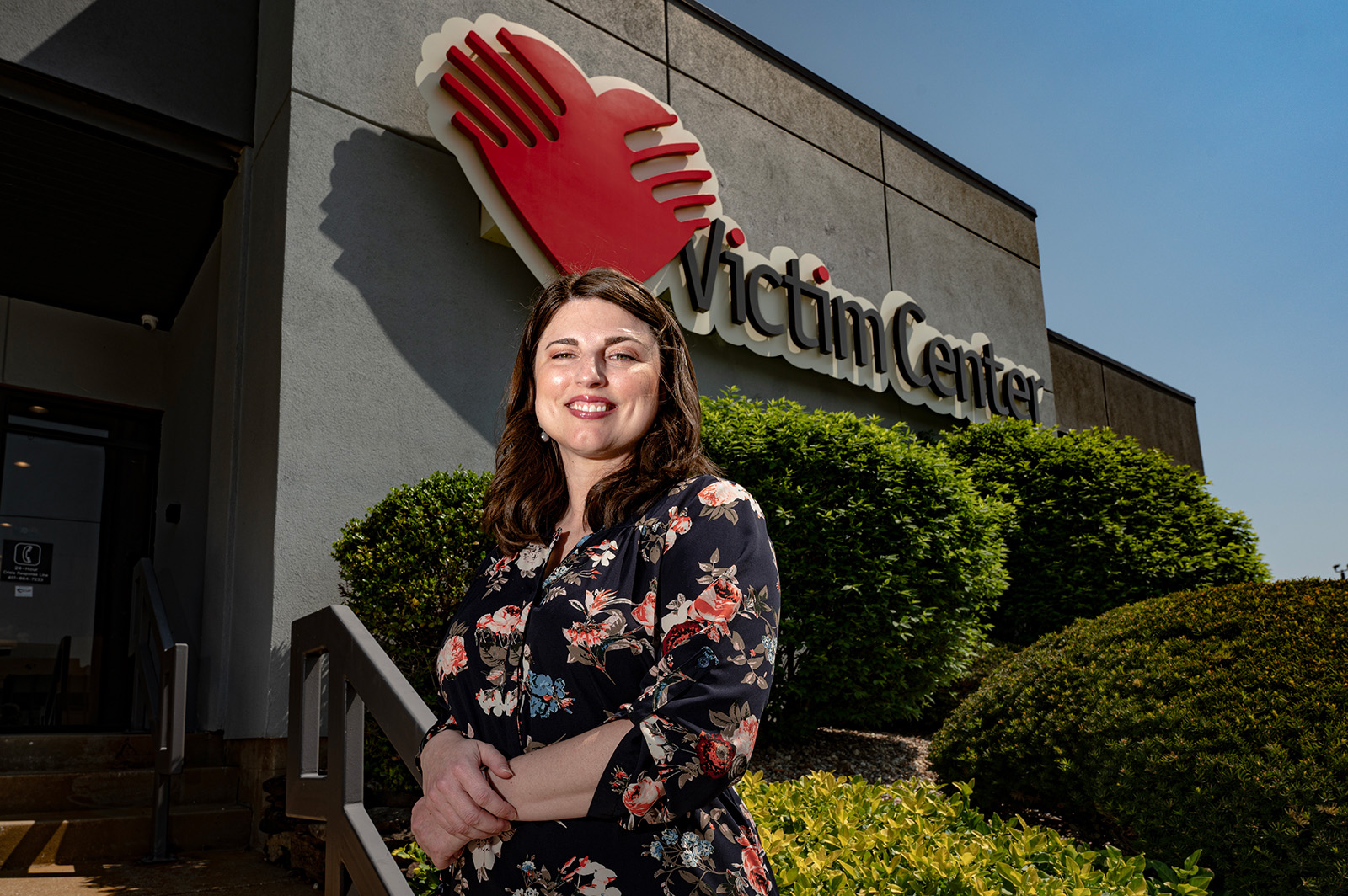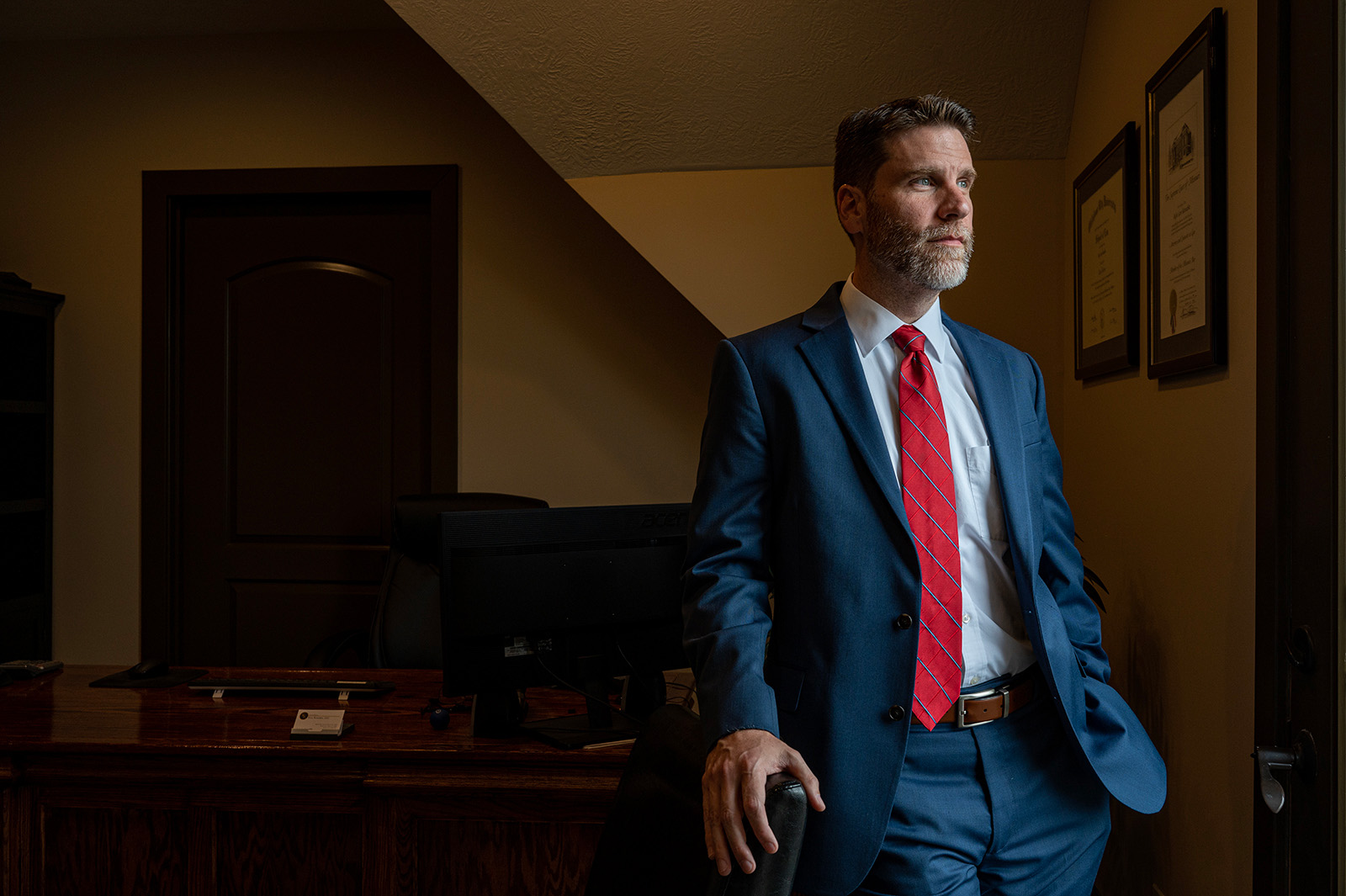IN-DEPTH |
Part of a series on domestic violence in Springfield and Greene County. Need help? See related story.
Christina Ford grew up knowing her mother was being abused. Ford’s mother was raised in a household with domestic violence, watching her mother be abused.
“It happened and you knew about it,” Ford said, “but no one ever discussed that with the children.
“I thought that was just what happened.”
And it happened again. To her. She was in an abusive relationship in high school.
Ford believes growing up in a home with domestic abuse led her to become a victim of domestic violence, even though she and her siblings were not the targets of any physical abuse.
“We're another generation that kind of grew up in that environment,” she said. “Then I myself began another generation that early on in my relationships, they started out to be abusive because that's what I normalized.”
Most experts say growing up in a home with domestic violence can lead to a cycle of abuse in which that child becomes a victim later in life. This is just one of the many negative impacts domestic violence can have on children.
“If you have a child that is experiencing these same types of (abuse) without that early intervention, then now as an adult, those adults may be more at risk for sexual assault, domestic violence,’ said Brandi Bartel, executive director of the Victim Center, a local resource for victims of any kind of abuse.

- Part I: Black eye for Greene Co.
- Part II: Obstacles to leaving
- Part III: Systemic issues
- Part IV: Searching for solutions
“They are more prone to risky behaviors in general. They might be more prone to suicide or self-harming behaviors. There’s a lot of long-term behavioral and mental and physical health risks.”
Ford stayed with that abusive boyfriend throughout her college years. But graduating from college motivated Ford to end the relationship. Something “just clicked” in her head, Ford said.
“It was a shift in life. It was a transitional period,” she said. “Just this self-awareness of like, ‘You are OK. You don’t have to be here. You don’t have to stay here…. I can move forward without this person, and we will be OK.”
Today, Ford is married to Missouri State University basketball coach Dana Ford. Together they created the Rebound Foundation, a nonprofit that raises awareness and funding for women leaving domestic violence. The foundation also operates a transitional housing program for survivors of abuse called Marda’s House.

A child exposed to domestic violence at home can have problems later in life
Addy Baez is a Victim Center therapist who is embedded at Harmony House, Greene County’s only shelter for victims of domestic violence and their children. Baez provides free therapy for the kids in shelter.
“It definitely affects children from a very young age,” Baez said. “Even if they are trying to be protected or sheltered or they are not in the same room at the same time, they will still be impacted.”
When a child or teen is constantly in a toxic stress environment, they are more likely to develop anger issues, trust issues, isolation and aggressiveness, Baez said.
The child can have problems with brain development that can lead to a shorter lifespan, cancer, heart disease, substance abuse and mental health challenges.
“The list can go on and on,” said Baez, who came to this profession because she and her mom fled domestic violence when Baez was a child. She remembers witnessing abuse and living in a shelter for their safety.
“I know exactly what my kiddos (at Harmony House) go through. I know how they are feeling,” she said. “What really breaks my heart and I see in most of my kiddos is they don’t have any aspirations. They don’t have any motivation. They don’t want anything. They just don’t want any yelling in the house. They don’t want any fighting, and that is a small thing to ask for.”
Exposure to domestic violence among so-called Adverse Childhood Experiences
Baez and Bartel pointed to what’s known as the ACE study (the Centers for Disease Control-Kaiser Permanente adverse childhood experiences study).
The ACE study was originally conducted in the 1990s to learn more about obesity and the underlying causes of it.
“While doing that study, they found something totally different,” Bartel said. “They really started honing in on some commonalities of trauma for those individuals who were exhibiting obesity, and they kind of switched gears and started focusing on childhood trauma because that was a common linkage with these study participants.
“They have about 10 adverse childhood experiences that they have identified and delineated as things that would impact broader health outcomes later in life,” Bartel continued. “Those who have actually had six or more adverse childhood experiences have a life span that is 20 years shorter than the rest of the population.”
Being exposed to domestic violence as a child is one of those “adverse childhood experiences.”
Others include potentially traumatic events like experiencing violence and having a family member attempt or die by suicide.

“For our clients in particular who have experienced domestic violence, we know that there’s a lot of overlap with things like substance abuse, poverty, certainly that mental health component,” Bartel said, “So it’s not a stretch to anticipate that a lot of our clients at the Victim Center have probably experienced four or more adverse childhood experiences when they come in the door.
Some kids are innately resilient. Some aren’t. But regardless, a child’s resilience can be challenged and broken down by traumatic events in childhood.
“The more adverse childhood experiences, the less resilient you might be if you don’t have the proper interventions and treatments,” Bartel said.
Children may suffer from abuse tactics other than physical
Bartel said she wants to be careful and not “do absolutes” because there are so many different circumstances and every situation is unique.
“But sometimes people will say, ‘Oh, the child wasn’t directly assaulted, so therefore, they just witnessed this and therefore they were not actually a victim,” she said. “If you’ll look at the dynamics of power and control in that home, those are all various forms of abuse that the child is most likely experiencing in the home environment.”
For example, isolation is a common tactic abusers will use to control their victims. With children, this often means not letting them participate in school activities or visit grandparents or other family members.
Manipulation is also common. An abuser might tell the child they don’t want to play with the child because the other parent “was being mean to me.”
“So many of the kiddos, they may not have been physically beat up,” Bartel said, “but if you ask them if they feel safe, they will say no. And the reason is they are still a victim. They have experienced all those types of abuse.”
But if the child is removed from the domestic violence household and given appropriate treatment or therapy, odds are the child can recover.
“Our brain creates neurons every single day and it repairs the damaged ones,” Baez said. “Early intervention is key.”

‘We don’t want children in a home with violence — period’
If an allegation of child abuse or neglect is made, the court will appoint a guardian ad litem, which is an attorney assigned to represent the best interests of the child.
Springfield attorney Kyle Kanable has dedicated much of his 20 years in practice to serving as a guardian ad litem. He was recently appointed to become a family court commissioner starting in May. He spoke with the Hauxeda in March.
As guardian ad litem, Kanable clarified he is not the child’s attorney and is not there to do whatever the child or either parent wishes. He investigates the case — usually a divorce or child custody dispute — and then makes recommendations to the judge that are in the best interest of the child.
The judge or commissioner is not obligated to follow the guardian ad litem’s recommendations, Kanable said. But the judge will seriously consider those recommendations.
Kanable believes children are negatively impacted when domestic abuse is happening in the home, even when the child is not the target of the physical abuse.
“I have an 8-year-old and I can’t imagine the damage and harm that it would have on her if I were to ever strike her mother or her mother strike me in her presence,” he added. “We are two people that that child unconditionally loves. There’s nothing that we can do that would change that opinion of us. And if she were to see one of us exert violence on the other … it would devastate her.”
Kanable said he would not recommend someone be awarded custody if there was evidence of recent domestic violence. But if the parent had an old conviction — like maybe 10 years in the past — and had been a model citizen ever since, Kanable said he would recommend custody.
“I think if an individual is going to be violent towards another individual in the household but never towards the child, what message are you sending the child?,” Kanable asked. “Are you sending the message to the child that it’s OK to be violent? Are you sending the message to the child that this is some sort of normalcy — that this is how normal families act? Does that mean when the child gets older, he or she will act that way because that is how they were raised and what they saw?
“We don’t want children in a home with violence — period, even if it’s not directed at the child,” he said. “For me, violence is violence and if I’m going to court, I’m going to make sure that the court is fully aware of what a child has observed.”
However, Kanable said he doesn’t make such a recommendation based solely on an accusation of abuse from one parent. He needs some sort of evidence that he can present to the court.
“Because what happens is that if it’s husband or wife or boyfriend or girlfriend or whatever, if you ask one or are told by one that there was some sort of incident or even a substantial amount of domestic violence,” he said, “if you ask the other person, they are going to deny it. Always. It’s always two sides to every pancake type thing.
“But if you have a police report, if you have some third eyes on this — an officer shows up and says X told me Y and I was able to see X had marks or some redness around the throat or a mark on the eye,” Kanable said, “that gives a little bit more evidence that can establish there was an incident that occurred.”

Yet Greene County judges say Missouri law favors co-parenting, and a judge simply can’t deny visitation rights to one parent just because the child has witnessed that parent abusing the other.
“Because the child is not the victim of the abuse,” Associate Circuit Judge Mark Powell said in a late February interview with the Hauxeda.
“Now if the child is the victim of the abuse, then that is another situation,” said Powell, who subsequently retired in May. “But just because they witnessed it, I'm not sure the law would allow me to grant that order of protection.”
Getting help through the Victim Center
The Victim Center is a Springfield-based nonprofit that provides free-of-charge services to all victims of violent or sexual crimes, including counseling for children and teens.
The Victim Center’s main office at 815 W. Tampa St., is open for walk-ins 9 a.m. to noon and then 1-5 p.m. Monday through Thursday.
The Victim Center has navigators embedded at the Greene County Family Justice Center where they can provide on-site services to those fleeing domestic violence. They are available for walk-ins 8:30 a.m. to 4 p.m. Monday through Friday.
Survivors of abuse can seek services from the Victim Center at any time — even years after the abuse occurred. “It doesn’t matter when the crime occurred,” Bartel said. “You may not feel ready right now. You can come back later when you are ready. Same is true for kids.”
“Therapy is the primary reason people reach out to us because it’s a service that is hard to access elsewhere,” Bartel said. “There’s limited mental health providers in our community unfortunately so people do find what we do appealing, not just because it’s free of cost but also because we specialize in trauma and victimization. For those who have had those experiences, they feel like they are best supported here because we provide wrap-around services.”
The Victim Center’s 24-hour crisis response line never closes and can be reached by calling 417-864-7233 (SAFE). This number is for individuals who want to talk to an advocate.
“We are going out in-person to hospitals, law enforcement agencies or working with victims over the phone no matter the day or hour to ensure that in those crisis moments, we are providing basic crisis interventions, creating a safety plan, linking those clients to maybe our partners at Harmony House or the Family Justice Center,” Bartel said. “We try to meet those emergency needs initially to establish safety. And then long term, it is up to the client what additional resources they want to utilize.”
Learn more
Learn more online about resources available through the Victim Center.
Find more information about the potential impacts intimate partner violence can have on children in the home from the National Child Traumatic Stress Network.
Learn more about the Adverse Childhood Experiences study on the CDC website.
About Living in Fear
This special investigative report explores the far-reaching and insidious nature of domestic abuse in our community. Living in Fear is being presented in four parts over two months:
- Part I: Black eye for Greene County, which was published May 8-11, looks at the depth and breadth of the problem here.
- Part II: Obstacles to leaving, published this week, examines the dynamics and complications facing victims looking to leave abusive relationships.
- Part III: Systemic issues, to be published in early June, puts a focus on the criminal justice system and potential shortcomings.
- Part IV: Searching for solutions, to be published in late June, taps local, regional and national experts in search of ways to improve the system and reduce domestic violence.
Coming in June in the Living in Fear series: A focus on the criminal justice system, its programs and potential shortcomings.

